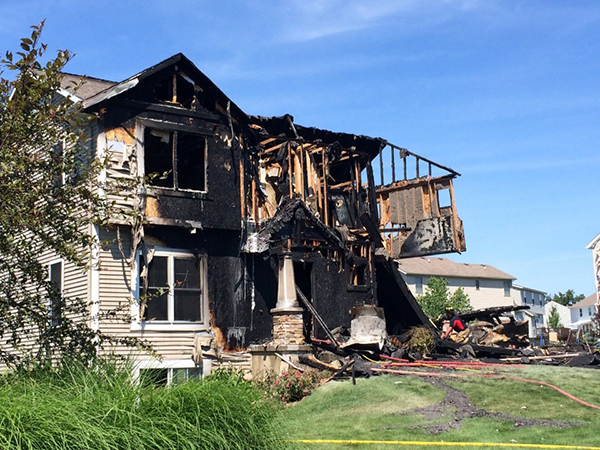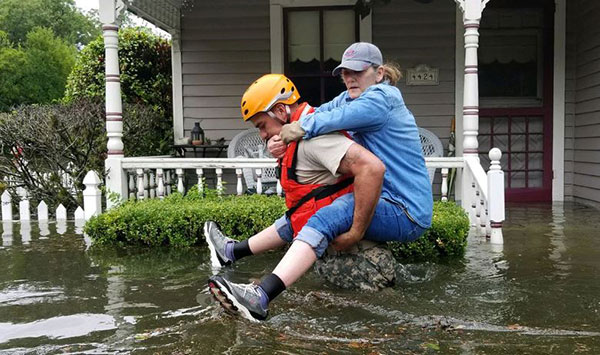If you were evacuated from your home due to raging forest fires, it will be an emotional experience to return after the flames are no longer burning. Chances are you’re hoping the damage wasn’t very bad while at the same time bracing for the worst. Make sure that you are returning only after local authorities say it’s safe to do so, not beforehand. Also, immediately after a wildfire has been stemmed the roads will be filled with emergency workers, so you want to avoid driving and wait it out a little longer.
The following are some steps you should take once you’re ready to return home:
Checking Your Home’s Structural Elements for Safety
- If local authorities tell you it’s safe to return but you find tape placed on doors or windows to signify damage, make sure that it’s okay for you to enter. There’s a chance it may not be safe to do so. Checking is the best policy.
- Even if you’re permitted to enter your home, it may be unsafe and very traumatic to see. Leave the children with friends or family while you inspect the premises.
- Check the outside of your home for scorched trees that may be hazardous to the house.

- Look for loose wires, power lines or gas lines.
- Check for foundation cracks.
- Make sure all the supporting beams are still in place.
- Sniff and listen for the hissing of leaking gas. If you suspect there’s a leak, leave right away and call the fire department. If you have a propane tank, turn off all valves and contact your supplier to inspect the system.
- Don’t push or lean against damaged walls because they may give.
- If the front door won’t budge open, it may be supporting the structure. Don’t force your way in or it may collapse.
- If the ceiling is sagging, it means it needs to be replaced. It may also be holding some water, so be careful.
- If the floor is sagging, it could collapse so don’t walk on it.
- Open all windows and doors to dry out the house.
- If you’re doing any sort of cleanup of fire ash, wear masks.
- If the power is out, use a flashlight, but do not light anything inside, not even a candle or a cigarette.
- If you see broken or frayed wires, turn off the electricity at the fuse box or circuit breaker (if there is water on the floor, do not touch it directly, but with a piece of wood).
- If you see any breakers that were tripped, call an electrician immediately. Do NOT turn them on. This could be an indication of extensive damage to the wiring inside the house.
- Call a plumber if sewage lines are damaged and avoid using the water. Instead turn it off at the main valve.
- If you have a heating oil tank system have a professional inspect it before using it again.
- Most importantly, take photos of the damage. You’ll need these to make your insurance claims.
Emotional Health after a Disaster
It’s important to know that it’s normal to feel exhausted, sad and hopeless after surviving a disaster, especially if it has destroyed your home entirely or even partially. It’s even more important to note that children feel this too.
If you are having a hard time getting back into your regular routine or aren’t eating properly, sleeping enough and are depressed, you should consider getting some professional help. First, try to lean on loved ones, and know that the stress you feel is normal. If your depression doesn’t dissipate after a few weeks, there are resources out there for help.
Contact your local Red Cross Disaster Mental Health or community mental health professional or call the Disaster Distress Helpline at 1-800-985-5990 or Text “TalkWithUs†to 66746.
Insurance and Financial Challenges         Â
We won’t whitewash the truth: You will likely face financial challenges because of the damage done to your home. The first thing you want to do is reach out to your insurance agent and tell them what has happened to your home. At this point, just a general description will suffice.
Whatever you do, do not stop paying your insurance premiums or else you won’t be covered for expenses after the disaster.
The following tips are for filing a wildfire claim:
- Make a list of damaged, destroyed or lost items. Try to find as many receipts for these as possible. If you’ve taken photographs or made videos of the items before the disaster, you’re a step ahead. Now, do the same with the damaged items.
- Do not throw anything away, as useless as it may appear, until after your claims adjuster has visited the home.
- Keep receipts for all your new expenses: rent, repairs, etc.
- Keep the originals of everything. Only give copies to the claims adjuster. You may be able to use some of this information to get a tax break too.
- Press the insurance company to act right away after filing your claim. You may or may not be able to get an advance on your claim for essentials (keep in mind that you won’t be covered if they are not necessities or if they’re completely overpriced).
- Stay organized with paperwork as you continue to make repairs to your home.
In California, insurance companies must respond within 30 days of you filing a claim. If there are no issues, they must send you payment at that time as well. If your insurer is not responding, write them and tell them you are contacting the Department of Insurance.
Buy time by trying to keep your policy open for as long as possible. You may forget to claim something important, but if your policy is closed, there will be nothing you can do about it.
If you have any question or want to learn more about buying the right insurance to protect you in the event of a fire, call an Auto Insurance Specialist at 888.772.4247.
Helpful Links When Filing an Insurance Claim:
If you haven’t experienced a fire that has affected your home but live in an area where you are prone to such a disaster, click here to read our article on what to do to prepare in case you are affected one day.
The information in this article was obtained from various sources. This content is offered for educational purposes only and does not represent contractual agreements, nor is it intended to replace manuals or instructions provided by the manufacturer or the advice of a qualified professional. The definitions, terms and coverage in a given policy may be different than those suggested here and such policy will be governed by the language contained therein. No warranty or appropriateness for a specific purpose is expressed or implied.



